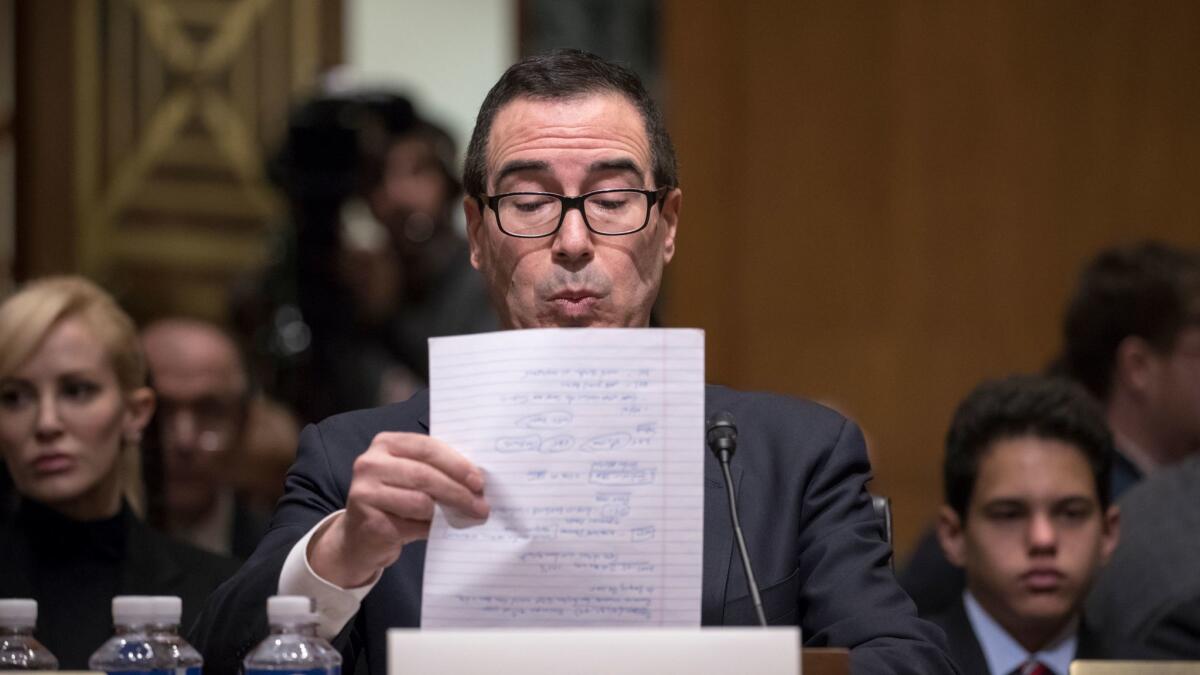House approves two-year deal to raise debt ceiling and increase government spending

The House on Thursday approved a deal crafted by Treasury Secretary Steven T. Mnuchin and Speaker Nancy Pelosi to lift the nation’s debt ceiling and raise caps set on federal spending for the next two years.
Despite opposition from most Republicans and some progressive Democrats, most members agreed that the deal was a necessary compromise considering the divided government and, more importantly, the need to prevent the nation from defaulting on its debt. It passed 284 to 149.
Democrats were frustrated that the agreement didn’t do more to limit President Trump from moving money between federal accounts, such as for a wall at the southern U.S. border. Republicans grumbled about $320 billion in new spending above the limits previously set in law.
The deal sets up $1.37 trillion in spending next year, up from $1.32 trillion this year, and slightly more in 2021. Lawmakers would still have to enact legislation to decide how exactly to spend that money. And the last such appropriations battle, in December, led to the longest partial government shutdown in history.
But the measure eliminates the chances of another partisan fight over the debt limit until after the 2020 presidential election. And by setting the top-line government budget figures, it reduces the odds of a pre-election standoff over spending, though that’s still possible this fall.
The package is expected to get a vote next week in the Senate, where is it likely to pass. Trump tweeted Thursday morning in strong support of the deal, suggesting that he would sign it.
“House Republicans should support the TWO YEAR BUDGET AGREEMENT which greatly helps our Military and our Vets. I am totally with you!” Trump tweeted.
Republicans touted that the plan includes $100 billion less in new spending than what Democrats wanted and prevented steep cuts to defense. But that wasn’t enough to win over many conservatives.
“The amount of funding allowed under this deal is simply more than the United States can afford,” said California Rep. Doug LaMalfa (R-Richvale), who opposed the bill. “America has a spending problem and it needs to be reined in so that our children aren’t the ones paying the price.”
Progressives weren’t happy either, but largely supported the measure.
“It’s not a perfect deal by any means,” said a statement from Reps. Pramila Jayapal (D-Wash.) and Mark Pocan (D-Wis.), leaders of the House Progressive Caucus. “However, it will allow for major, long-overdue investments in domestic priorities — including housing assistance, food aid, education and job training.”
The bill passed with 219 Democratic votes, one more than the minimum needed for passage in the House. The strong Democratic support underscored the whipping power of the speaker and that Democrats felt the bill was a good deal for them.
The package, negotiated largely between Mnuchin and Pelosi (D-San Francisco), marks one of the few and most significant bipartisan legislative accomplishments in this Congress, which has been marred by partisan squabbles.
Conservatives in the White House, such as acting Chief of Staff Mick Mulvaney, had been largely sidelined as Pelosi and Mnuchin negotiated. They chatted by phone several times each day in the days and weeks ahead of the deal’s release earlier this week.
Negotiators cobbled the deal together by combining two significant fiscal lifts for Congress. First, lawmakers had to raise the debt limit — which Republicans often protest — by September.
In addition, a bipartisan group of lawmakers wanted to eliminate deep cuts to federal programs that would go into effect next year. Mnuchin and Pelosi combined the two to create a bill that — like most major agreements in Washington — few really loved.
The debt limit has proved politically contentious in the past as some Republicans have recently insisted on spending cuts in exchange for raising the limit. GOP leaders said they were glad to resolve the issue for now.
“The absence of chaos is to the advantage of both sides,” Senate Majority Leader Mitch McConnell (R-Ky.) said. “But I think particularly to the advantage of our side because we do have a Republican administration. People expect us to be the governing party.”
By raising the spending caps through 2021, the deal marks the formal end to the 2011 effort by former President Obama and then-Speaker John A. Boehner (R-Ohio) to try to control federal spending by imposing deep cuts to federal programs. The cuts, known as sequester, were only supposed to happen if lawmakers weren’t able to agree on what in the budget to cut.
A political agreement never came. But neither did the mandated cuts. Lawmakers voted to reverse the cuts in every budget deal since they took effect. The sequester caps expire by law in 2021.
Republicans who once hailed fiscal conservatism defended their decision to support the deal.
“I make no apologies for this two-year caps deal,” McConnell said on Tuesday. “The alternatives were much worse,” he said, pointing to deep cuts and fiscal uncertainty.
More to Read
Get the L.A. Times Politics newsletter
Deeply reported insights into legislation, politics and policy from Sacramento, Washington and beyond. In your inbox three times per week.
You may occasionally receive promotional content from the Los Angeles Times.







